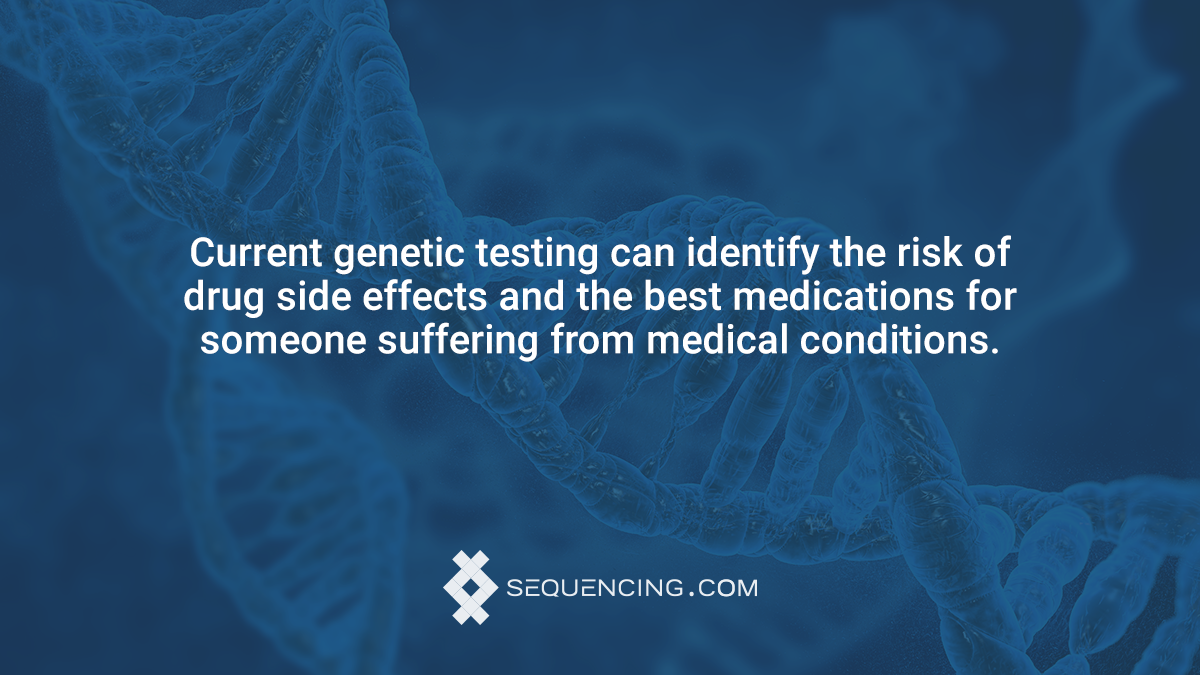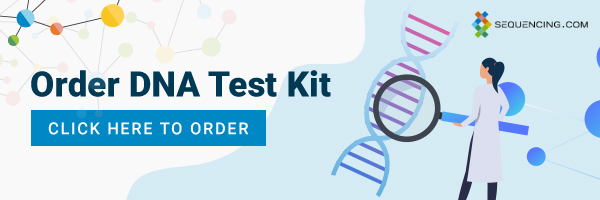By Dr. Brandon Colby MD, a Personalized Preventive Medicine specialist and expert in clinical genomics.
Many people suffer from medication side effects. These side effects can come from over-the-counter (OTC) medications, prescription drugs, and herbal and dietary supplements. These side effects are not necessarily always considered allergic reactions, but they do have the potential to be life-threatening if ignored.
In this guide, you will learn:
- The effects of medicine on the body and why drugs have side effects
- Common side effects from over-the-counter and prescription drugs
- How quickly drug side effects happen
- How long medicine side effects last
- What to do when medicines have side effects and how to reduce them
The Effects of Medicine on the Body
Medicine can include many different types:
- Over-the-counter medications such as acetaminophen (Tylenol®), ibuprofen (Advil®), dextromethorphan (cough suppressant in NyQuil®), and loratadine (Claritin®)
- Prescription drugs like lisinopril, gabapentin, amlodipine, amoxicillin, and metformin
- Herbal supplements including echinacea, St John's wort, and ginkgo
- Dietary supplements such as Garcinia Cambogia extract, raspberry ketones, and green coffee bean extract
Whenever any of the above medicines are ingested, they go through four stages, referred to as ADME.
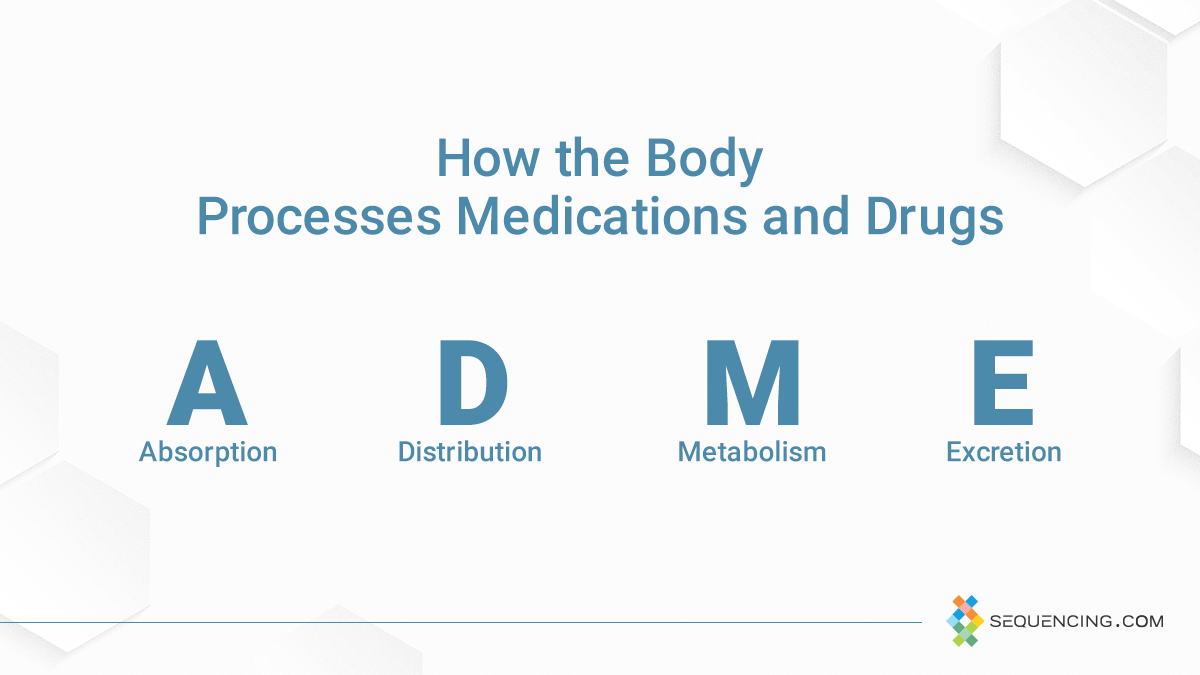
- Absorption
Absorption is the first stage and means the medicine has entered our body. Orally administered drugs, such as swallowing a pill, enter our bloodstream by being absorbed through the walls of the small intestine. The drug is then taken by blood vessels to the liver. The liver processes the medicine, and then the processed medication circulates throughout the body to do its work. Other forms of administration of medications, such as intravenous and rectal, bypass the liver so the medication enters the bloodstream faster and without any processing. - Distribution
The bloodstream carries the medicine throughout the body. Medication side effects often begin at this stage because the drug infiltrates an area of the body that it wasn't intended for, such as the stomach instead of a sore leg muscle.
The distribution also isn't always a smooth process. The blood-brain barrier can make it difficult for medicine to reach the central nervous system. Proteins and fat molecules can also make it difficult for drugs to reach their destination. - Metabolism
Once the medicine has reached its destination and does its job, it gets metabolized or broken down. This stage makes the excretion process much easier. How quickly the liver metabolizes medicines can be affected by a person's genetics and can lead to medication side effects, drug interactions, and allergic reactions. - Excretion
Metabolized drugs get flushed out of the body through urine and feces. Measuring the concentration of the drugs in urine can identify how readily they are metabolized. When drugs are metabolized too quickly, a higher dose may be needed for better treatment results.
Effects of Medicine on the Body
Why Drugs Have Side Effects
Drugs have side effects because they interrupt bodily processes in some way. Our body naturally produces helpful chemicals that regulate and control almost everything that occurs without the body. When outside chemicals such as the ones in over-the-counter medications and prescription drugs are introduced into the body, it can disrupt the processes.
The ways drugs interact with the body determine whether someone suffers from adverse effects. Every person's body has a different chemical makeup determined by:
- Genetics
- Weight
- Age
- Ethnicity
- Gender
- Health conditions
- ...and much more.
The genetic makeup of people has been studied. With pharmacogenomics research, scientists have been able to identify changes within genes in people who have reported side effects from certain medications, such as high blood pressure, diabetes, or those for another medical condition.
Drug interactions are another cause of side effects. When two types of drugs interact inside of the body, it can cause undesirable reactions.
Learn More: Medication Side Effects
Common Drug Side Effects
The adverse effects of over-the-counter medications and prescription drugs can be mild, moderate, or severe. In some extreme cases, they can be life-threatening.
The National Cancer Institute (NCI) defines an 'Adverse Event' related to medication as an unexpected medical problem that results from drug treatment or therapy. The U.S. Food and Drug Administration (FDA) bases their approval of treatments on possible side effects, which is why the organization encourages people to report any adverse events they may experience to them or to a health care professional.
Many people do not realize that herbal supplements and dietary supplements also pose a risk. Medication non-compliance and non-adherence also increase the risk of an adverse event.
The most common side effects people report are:
- Constipation
- Skin rash or dermatitis
- Diarrhea
- Dizziness
- Drowsiness
- Dry mouth
- Fatigue
- Headache
- Hives
- Insomnia
- Irregular heartbeat
- Nausea
- Upset stomach
- Rash
- Vomiting
Serious effects that could be life-threatening include:
- Anaphylactic reaction (a severe allergic reaction)
- Internal bleeding
- Suicidal thoughts
- Cancer
- Heart attack
A possible side effect for pregnant women is having a baby with birth defects. Pregnant women should always speak to their health care provider about any drugs or supplements before taking them.
How Quickly Side Effects Happen
Side effects can happen within minutes after ingesting a medicine. It can also take hours or days depending on how long it takes for it to metabolize in your body.
Intravenous (IV): Effects are felt the fastest because the drug is directly injected into the bloodstream.
Inhaling: This can cause an adverse reaction just as quickly as through an IV.
Orally: Medicine must go through the digestive system before circulating the body, so it can take minutes or hours to feel any effects from it.
Rectal: The medicine has to be absorbed by the rectum and then goes into the bloodstream. It can take hours before someone feels any negative drug reactions.
Any changes in dosage could lead to undesirable results. Stopping some medication suddenly can lead to withdrawal symptoms or increasing a dose can cause side effects that were not felt at the lower dose. Adding a new medication or supplement can also cause a reaction.
How Long Medicine Side Effects Last
How long medicine side effects last depends on the dose and how long it takes for your body to metabolize it. Again, the rate of metabolism is affected by your ethnicity, age, weight, gender, health conditions, etc.
What's common among all people is that the body metabolizes medicine quickly at first and then slower as time goes on. As the medicine circulates through the body, some excrete out, leaving some behind in the body. The best way to explain it is by looking at it in half-life.
When someone takes 100 mg of a drug, the body sends it into the bloodstream. Only half of it may still be in the bloodstream in three hours because the liver is continuously filtering the blood. The liver doesn't metabolize all of the drugs at one time, though. It can take several passes. This means the drug concentration in the blood can go from 100 to 50 mg, 40 mg, 35 mg, 20 mg, and 5 mg until it's completely out of the body.
Side effects may be the worst when the concentration of the drug is the highest in the blood. The feelings subside as the amount in the blood decreases. It's difficult to pinpoint how long it will take for the drugs to leave the body without knowing how fast it metabolizes the amount taken.
How to Know the Risk of Drug Side Effects
Before taking any new drug, be sure to carefully read the package insert for drug information, especially look for a black box warning. Most identify possible side effects and data from clinical trials that increase the risk of suffering from them. It's also possible to research health information on the National Library of Medicine (NIH) website.
The FDA offers a MedWatch program, which releases information about medical products’ safety in the United States. Check the website to stay updated on the latest information about adverse events related to some of the most used prescriptions, over-the-counter medications, and supplements.
What To Do When Medications Have Side Effects
The best thing you can do is contact your health care professional for medical advice when you suffer from severe side effects that affect your everyday life. Your healthcare provider will let you know if there needs to be a new drug prescribed or a reduction in dose.
Never start, change, or stop taking a doctor prescribed medication without consent. A change in dosage or drug can cause serious side effects that may be life-threatening.
How to Reduce Side Effects
Taking medications as directed or prescribed can reduce the risk of side effects. Although many people still suffer from them even when they follow their health care professional's advice perfectly. This is why many people have turned to genetic testing to help them reduce the possibility and severity of side effects.
Reducing side effects starts with knowledge about the body and how efficiently it metabolizes certain drugs. While some people have learned how well their body processes certain medications, it's usually through trial and error which means going through a lot of pain and suffering first.
Fortunately, researchers in the field of pharmacogenomic have discovered how genes affect a person's response to drugs. Drugs available today are designed to help the greatest number of people, but not everyone is the same.
For example, not everyone will respond to a highly effective medication such as statins to lower cholesterol and many have worse drug reactions than others. By looking at the genetic differences between people who do not benefit from certain medications or suffer from serious side effects, they can identify others who may have the same experience.
A health care provider can use the information to select the right medication with the right dosage.
Pharmacogenomics has benefited patients and the healthcare system by:
- Reducing the number of failed attempts at stabilizing medical conditions
- Decreasing the risk of adverse events and hospitalizations due to them
- Saving money for patients because of fewer trial and errors
Medication and Drug Response Advanced Pharmacogenomics Analysis
`video: https://www.youtube.com/embed/aNW-XvjTSI4`
The Medication & Drug Response DNA Report includes information about your risk of side effects with common medication as well as your risk of addiction to certain medications and illicit drugs.
The report includes:
Response to medications
- Risk of harmful side effects
- Risks of addiction
Medications included in the report are:
Anticoagulants
- Antidepressants
- Asthma treatment
- Cardiovascular disease treatment
- Neuropathic pain treatment
- Type-2 diabetes treatment
- Addictive medications
- Illicit drugs
Sample Report Pages
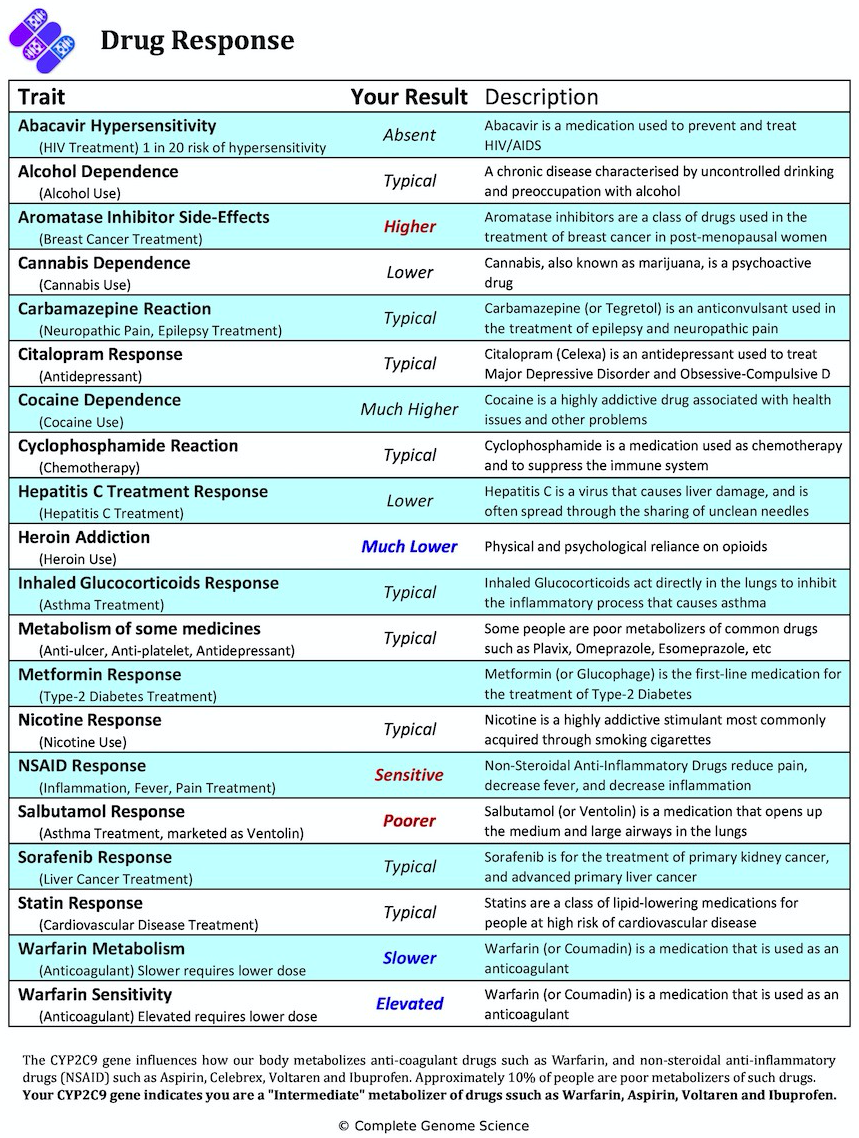
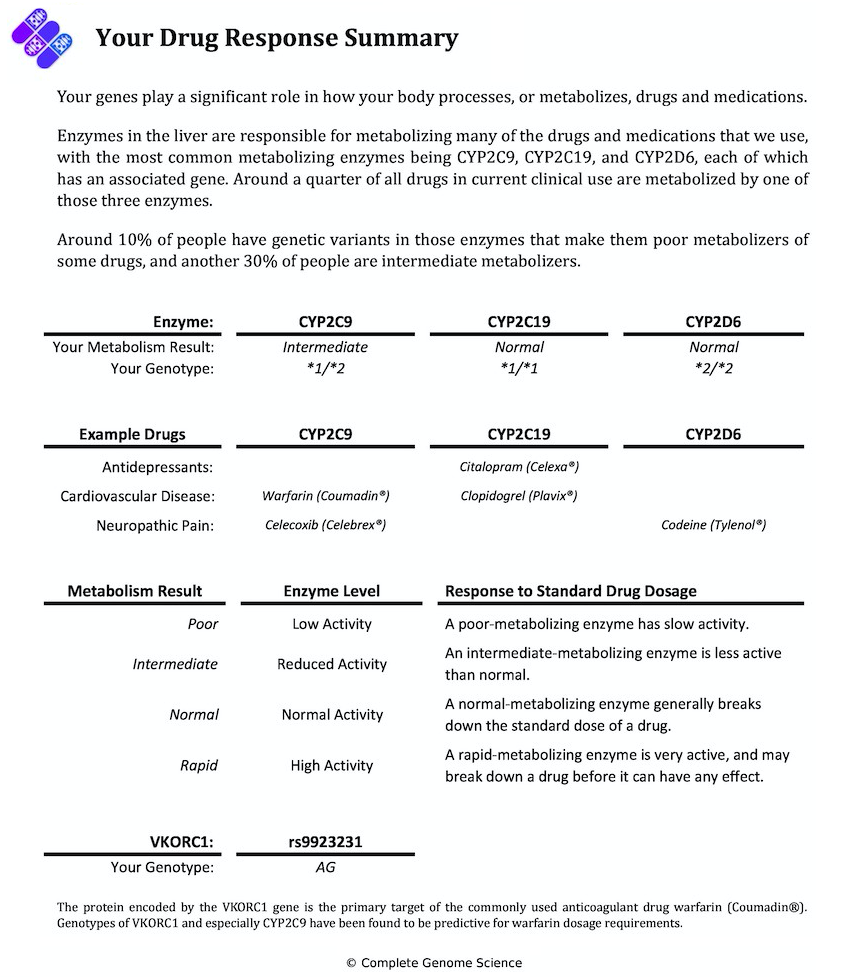
How to Get Started With A DNA Test
To order a DNA test, click on the 'Click Here To Order' button above.
If you've already taken a DNA test, you can upload your DNA data from almost all test providers, such as 23andMe, AncestryDNA, or MyHeritage. Click the button below to upload your raw DNA data for free.
About The Author
Dr. Brandon Colby MD is a US physician specializing in the personalized prevention of disease through the use of genomic technologies. He's an expert in genetic testing, genetic analysis, and precision medicine. Dr. Colby is also the Founder of Sequencing.com and the author of Outsmart Your Genes.
Dr. Colby holds an MD from the Mount Sinai School of Medicine, an MBA from Stanford University's Graduate School of Business, and a degree in Genetics with Honors from the University of Michigan. He is an Affiliate Specialist of the American College of Medical Genetics and Genomics (ACMG), an Associate of the American College of Preventive Medicine (ACPM), and a member of the National Society of Genetic Counselors (NSGC).
